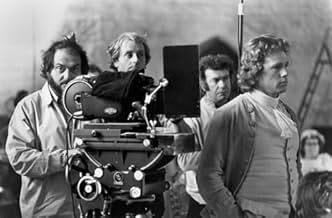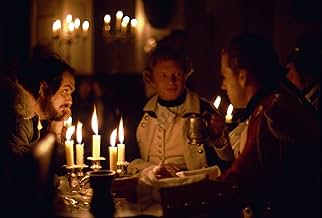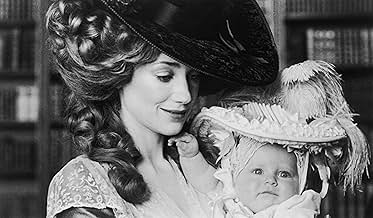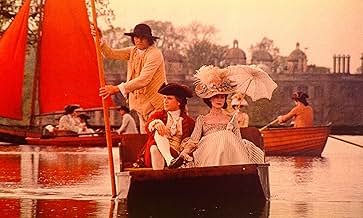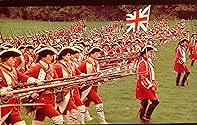Im England des 18. Jahrhunderts gewinnt ein irischer Schurke das Herz einer reichen Witwe und übernimmt die aristokratische Stellung ihres verstorbenen Ehemanns.Im England des 18. Jahrhunderts gewinnt ein irischer Schurke das Herz einer reichen Witwe und übernimmt die aristokratische Stellung ihres verstorbenen Ehemanns.Im England des 18. Jahrhunderts gewinnt ein irischer Schurke das Herz einer reichen Witwe und übernimmt die aristokratische Stellung ihres verstorbenen Ehemanns.
- Regie
- Drehbuch
- Hauptbesetzung
- 4 Oscars gewonnen
- 17 Gewinne & 14 Nominierungen insgesamt
Hardy Krüger
- Capt. Potzdorf
- (as Hardy Kruger)
Diana Körner
- Lischen - German Girl
- (as Diana Koerner)
André Morell
- Lord Gustavus Adolphus Wendover
- (as Andre Morell)
Zusammenfassung
Reviewers say 'Barry Lyndon' is acclaimed for its breathtaking cinematography, intricate period details, and masterful use of natural light, often likened to fine art. It explores themes of human folly, the quest for wealth and status, and the resulting downfall. However, some criticize its slow pace, the perceived lack of emotional depth in characters, especially Ryan O'Neal's performance, and its lengthy runtime. Despite these drawbacks, many regard it as a significant artistic achievement and a standout in Kubrick's oeuvre.
Empfohlene Bewertungen
The beauty, the depth, and the mystery of this film are unsurpassable - what Kubrick was doing with light is just a miracle. Special lenses were designed to shoot interiors and exteriors in natural light. In one scene Barry (Ryan O'Neil) was having a dinner with a German woman who was feeding her baby and the candle light made the whole scene look like a Caravaggio's painting. This is just one of many scenes. Each of them is perfection and harmony. Costumes and sets were crafted in the era's design. Age of Enlightenment with its gallantry, wars, and duels, had been recreated in the film with the precision of the celebrated landscape and portrait masters of the period such as Thomas Gainsborough; Sir Joshua Reynolds, founder of the Royal Academy of Arts; George Romney to name just a few. If nothing else, watching BL is pure aesthetic delight - and there is one man who responsible for it, Stanley Kubrick. If ever divine film was made, "Barry Lyndon" was it and Kubrick could've quoted the Bible - "God looked at everything he had made, and he found it very good".
I've read the comments and articles that call "Barry Lyndon" cold, slow, boring, "the collection of pretty pictures', "flawed" masterpiece, and the most ridiculous one, "glittering ornament with a hollow center". I simply can't understand it. "Barry Lyndon" is the most compelling and compassionate realization of the inevitable finality of everything in this world which was presented by the visionary director with elegant sensual melancholy. Stanley Kubrick known for his detached, seemingly remote and non-sentimental style chose to reach out to his viewer directly during the epilogue, "It was in the reign of George III that the aforesaid personalities lived and quarreled, good or bad, handsome or ugly, rich or poor, they are all equal now". I don't recall any other movie that would illustrate the old wisdom, "everything will pass" in such sublime and deeply moving way.
I've read the comments and articles that call "Barry Lyndon" cold, slow, boring, "the collection of pretty pictures', "flawed" masterpiece, and the most ridiculous one, "glittering ornament with a hollow center". I simply can't understand it. "Barry Lyndon" is the most compelling and compassionate realization of the inevitable finality of everything in this world which was presented by the visionary director with elegant sensual melancholy. Stanley Kubrick known for his detached, seemingly remote and non-sentimental style chose to reach out to his viewer directly during the epilogue, "It was in the reign of George III that the aforesaid personalities lived and quarreled, good or bad, handsome or ugly, rich or poor, they are all equal now". I don't recall any other movie that would illustrate the old wisdom, "everything will pass" in such sublime and deeply moving way.
In the midst of the many wonderful films made by Stanley Kubrick, it is strange to note how rarely people mention "Barry Lyndon".
The film portrays an unusual young Irish man, Redmond Barry, and his endeavours as he is forced to leave his home and tries to make good his life elsewhere. His life away from home starts out as a career in the British Army; only to evolve in surprising ways and lead to as different places as a position of trust within the Prussian Army and later a title of nobility, gained by what our time can only measure as rather disgraceful means.
Some consider Barry Lyndon a slow and tedious film and it is in deed past three hours in length, but this is because of the artistic flow of a film that strays not only to tell a tale about a man who is by no means neither hero nor villain, but also a film which is in no hurry and takes the time for every detail to sink into the mind and heart of the viewer. Some of the scenic images in "Barry Lyndon" are in themselves pieces of art, rendered with a passion for the landscapes and the man-made structures within them.
The myth that all scenes were recorded using no artificial lighting no doubt stems from the very realistic lights during indoor takes, and some of them truly did not feature artificial light. This is but one of the many details that so easily conveys a sense of a realistic portray of the era; the 18th century and the time after the seven-year war in the later half of the century. The impressive atmosphere and the wonderfully picturesque scenarios along with the fact that the entire plot moves at a calm pace makes this film a very pleasant experience.
"Barry Lyndon is", amidst Kubricks' many masterpieces, a film so easily dismissed due to length and the fact that it is overshadowed by others, but I deeply recommend this film to anyone who would like to see a film both for the plot line, the story and the pure enjoyment of the images presented. Stanley Kubrick made many great films and this one is most definitely one of them! KimotoCat
The film portrays an unusual young Irish man, Redmond Barry, and his endeavours as he is forced to leave his home and tries to make good his life elsewhere. His life away from home starts out as a career in the British Army; only to evolve in surprising ways and lead to as different places as a position of trust within the Prussian Army and later a title of nobility, gained by what our time can only measure as rather disgraceful means.
Some consider Barry Lyndon a slow and tedious film and it is in deed past three hours in length, but this is because of the artistic flow of a film that strays not only to tell a tale about a man who is by no means neither hero nor villain, but also a film which is in no hurry and takes the time for every detail to sink into the mind and heart of the viewer. Some of the scenic images in "Barry Lyndon" are in themselves pieces of art, rendered with a passion for the landscapes and the man-made structures within them.
The myth that all scenes were recorded using no artificial lighting no doubt stems from the very realistic lights during indoor takes, and some of them truly did not feature artificial light. This is but one of the many details that so easily conveys a sense of a realistic portray of the era; the 18th century and the time after the seven-year war in the later half of the century. The impressive atmosphere and the wonderfully picturesque scenarios along with the fact that the entire plot moves at a calm pace makes this film a very pleasant experience.
"Barry Lyndon is", amidst Kubricks' many masterpieces, a film so easily dismissed due to length and the fact that it is overshadowed by others, but I deeply recommend this film to anyone who would like to see a film both for the plot line, the story and the pure enjoyment of the images presented. Stanley Kubrick made many great films and this one is most definitely one of them! KimotoCat
The genius Stanley Kubrick has truly outdone himself by crafting this masterpiece. After viewing A Space Odyssey, I thought there were no films more beautiful, but the breathtaking painting-like scenes of Barry Lyndon paired with music exquisitely chosen by Kubrick are simply stunning. There are some who may say that this film is too long or stale, but I say, that this film must be savoured slowly, and that one must enjoy it for what it is, which is almost like a series of ethereal paintings, one after another. Watch this film not for the end, but watch it and live with the fact that every scene is a part of the whole, and that the wholeness and oneness in itself is beautiful. Say, if we only watched movies for the ending, then composers who only wrote finales would be the greatest. All you must do is to simply sit down and relax, then, nothing else except absolute enchantment can possibly follow.
10Spleen
In fact it's one of Kubrick's most gripping pictures, with a narrative drive second only to that of "Dr. Strangelove" (and it's unquestionably a more glorious creation than, say, anything he made in the 1950s). English director Michael Powell (while attributing a similar failing to one of his own works) says that Kubrick fell into "the trap of the picturesque", but while I admire Powell as a creator, the judgment is absurd: at the VERY least, each lush image shows us people not just occupying a part of the screen but inhabiting a world, and tells us much about their relation to that world. Many shots are indeed amazing and beguile the eye, but they don't have the effect they do simply because they would make nice postcards.
THIS, I feel sure (without having read Thackeray), is the proper way to adapt a long story from novel to screen. Each scene is either allowed as much time as it needs to make its point and its impact, or it's cut altogether - you won't catch Kubrick skating too quickly over his material for no better reason than to fit it all in. The third-person narration (consisting of witty, beautifully crafted sentences - it's about time I did read Thackeray) almost performs a kind of dance with the images, gliding in just when we need it, taking a step back when we don't. (So rarely is even third-person narration used so well.) And as always, Kubrick's musical sense is unerring. My impression at the time was that I was listening to mid-eighteenth century music that gave way to pieces from the classical era as the hero started to move in higher and higher circles. I was more or less right. But then I noticed Schubert's name in the credits - and I realised with a start that I'd been listening to, had even started tapping my feet to, a Schubert piece I was familiar with, without the anachronism registering.
It's a pity Kubrick stopped making epics after this. Look at the ones he's responsible for: "Spartacus" (not a project Kubrick was fond of, admittedly, but still the most magnificent of all Roman epics) "2001" (the most magnificent of ALL epics), and "Barry Lyndon". The last of the three is by no means a poor cousin.
THIS, I feel sure (without having read Thackeray), is the proper way to adapt a long story from novel to screen. Each scene is either allowed as much time as it needs to make its point and its impact, or it's cut altogether - you won't catch Kubrick skating too quickly over his material for no better reason than to fit it all in. The third-person narration (consisting of witty, beautifully crafted sentences - it's about time I did read Thackeray) almost performs a kind of dance with the images, gliding in just when we need it, taking a step back when we don't. (So rarely is even third-person narration used so well.) And as always, Kubrick's musical sense is unerring. My impression at the time was that I was listening to mid-eighteenth century music that gave way to pieces from the classical era as the hero started to move in higher and higher circles. I was more or less right. But then I noticed Schubert's name in the credits - and I realised with a start that I'd been listening to, had even started tapping my feet to, a Schubert piece I was familiar with, without the anachronism registering.
It's a pity Kubrick stopped making epics after this. Look at the ones he's responsible for: "Spartacus" (not a project Kubrick was fond of, admittedly, but still the most magnificent of all Roman epics) "2001" (the most magnificent of ALL epics), and "Barry Lyndon". The last of the three is by no means a poor cousin.
Barry Lyndon (1975) has to be Stanley Kubrick's most realized project that he has ever taken. A big task for the maverick director. For a film like this to be made during the free wheeling seventies had to take some big stones. One must admire Mr. Kubrick for even trying to produce and direct such a complex and expensive film that had all the ear markings of a financial and personal disaster. Not only did Kubrick manage to out do his last epic "2001" but he has created a movie that not only showcases the untapped acting abilities of Ryan O'Neil, but a beautifully lensed film that uses minimal lighting , gorgeous sets, perfect balance, positioning and meticulous timing. I have never seen such a magnificent film such as this one. Every shot and frame plays out like an eighteenth century oil painting.
A young Irish man of lower class has the strangest quirk of luck. After participating in an illegal duel, young Barry is forced to flee from his home village. After being accosted by some gentlemanly highway robbers, Barry winds up cross country and becomes a conscripted soldier. Rising in rank, Barry is sent to fight in the Seven's Year War. Whilst in battle he watches his friends and fellow soldiers being slaughtered in combat due to poor tactics and leadership. Having enough of this life of hardship and struggle, Barry uses his god given talents to do what he has to do in order to survive and become a man of proper social standing.
I was very impressed with this movie. I've put off watching this film until recently. Some have told me how long and boring this movie was. Others have said it was pretty self serving and not worth watching. But after seeing part of it on T.C.M., I just had to find a copy of my own. The film is over three hours in length but they go by very quickly because Barry's story is so captivating. Kubrick poured his heart and soul into this film. The results are on the screen. He's clearly a master film maker. His reputation is cemented forever with this movie. Ryan O'Neil impressed the hell out me with his role as Barry Lyndon. He gives the character some dignity and depth that no other actor could have possibly given to the title role.
Overall I would have to give this film one of my highest recommendations. This is one of my top ten films of all time. If people tell you not to watch this masterpiece ignore them. I advise you to get a copy and enjoy. For a film like this you need to set aside a weekend afternoon to fully appreciate a film such as this. Believe me you will not regret it.
Highest recommendation possible.
It doesn't matter whether you watch it on D.V.D. or V.C.D. because the transfers are excellent on either format.
A young Irish man of lower class has the strangest quirk of luck. After participating in an illegal duel, young Barry is forced to flee from his home village. After being accosted by some gentlemanly highway robbers, Barry winds up cross country and becomes a conscripted soldier. Rising in rank, Barry is sent to fight in the Seven's Year War. Whilst in battle he watches his friends and fellow soldiers being slaughtered in combat due to poor tactics and leadership. Having enough of this life of hardship and struggle, Barry uses his god given talents to do what he has to do in order to survive and become a man of proper social standing.
I was very impressed with this movie. I've put off watching this film until recently. Some have told me how long and boring this movie was. Others have said it was pretty self serving and not worth watching. But after seeing part of it on T.C.M., I just had to find a copy of my own. The film is over three hours in length but they go by very quickly because Barry's story is so captivating. Kubrick poured his heart and soul into this film. The results are on the screen. He's clearly a master film maker. His reputation is cemented forever with this movie. Ryan O'Neil impressed the hell out me with his role as Barry Lyndon. He gives the character some dignity and depth that no other actor could have possibly given to the title role.
Overall I would have to give this film one of my highest recommendations. This is one of my top ten films of all time. If people tell you not to watch this masterpiece ignore them. I advise you to get a copy and enjoy. For a film like this you need to set aside a weekend afternoon to fully appreciate a film such as this. Believe me you will not regret it.
Highest recommendation possible.
It doesn't matter whether you watch it on D.V.D. or V.C.D. because the transfers are excellent on either format.
Wusstest du schon
- WissenswertesProduction was moved from Ireland to England after writer, producer, and director Stanley Kubrick received word that his name was on an I.R.A. hit list for directing a movie featuring English soldiers in Ireland. Consequently, several scenes were dropped.
- PatzerThe narrator states, early on, "About this time, the United Kingdom was in a state of great excitement". The United Kingdom came into being in 1801, when it merged with the Kingdom of Ireland, before which it was known merely as the Kingdom of Great Britain. In fact the Act of Union of 1707, which joined England and Scotland, refers to "the United Kingdom of Great Britain" or "the United Kingdom" throughout the text. "United Kingdom" was in common use at the time of the film.
- Zitate
Title card: [End title card] EPILOGUE
Title card: It was in the reign of George III that the aforesaid personages lived and quarreled; good or bad, handsome or ugly, rich or poor they are all equal now
- Alternative VersionenThe 2011 Blu-ray plastered the opening Saul Bass variant of the Warner Bros. Pictures logo with the black and white WB shield.
- VerbindungenEdited into Hai-Kubrick (1999)
- SoundtracksPiano Trio in E-flat, Op 100 (second movement)
Composed by Franz Schubert
piano: Anthony Goldstone
cello: Moray Welsh
violin: Ralph Holmes
Top-Auswahl
Melde dich zum Bewerten an und greife auf die Watchlist für personalisierte Empfehlungen zu.
Details
- Erscheinungsdatum
- Herkunftsländer
- Sprachen
- Auch bekannt als
- Баррі Ліндон
- Drehorte
- Produktionsfirmen
- Weitere beteiligte Unternehmen bei IMDbPro anzeigen
Box Office
- Budget
- 11.000.000 $ (geschätzt)
- Weltweiter Bruttoertrag
- 284.426 $
- Laufzeit3 Stunden 5 Minuten
- Farbe
- Sound-Mix
- Seitenverhältnis
- 1.66 : 1
Zu dieser Seite beitragen
Bearbeitung vorschlagen oder fehlenden Inhalt hinzufügen





